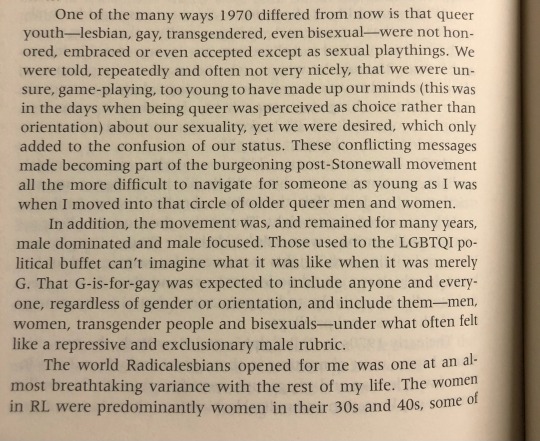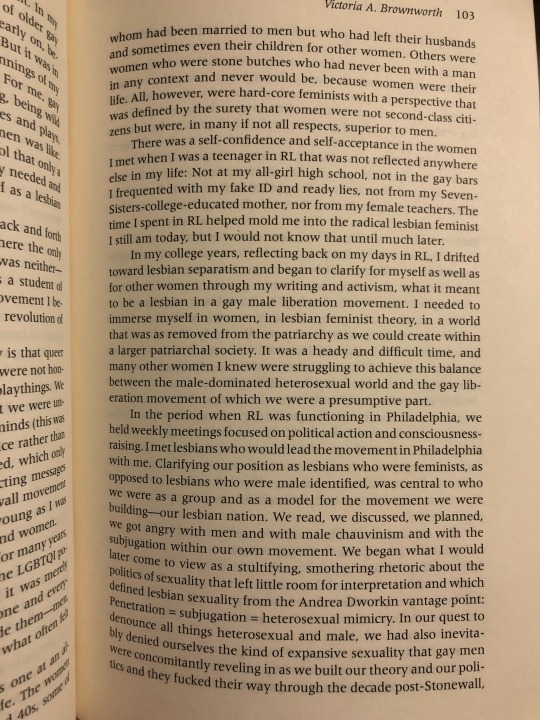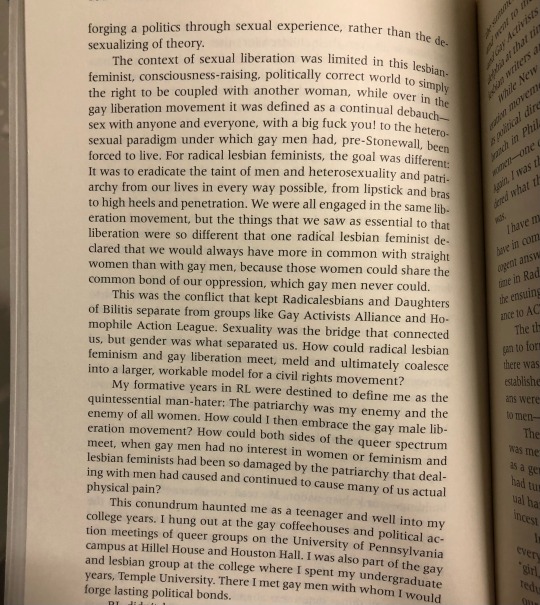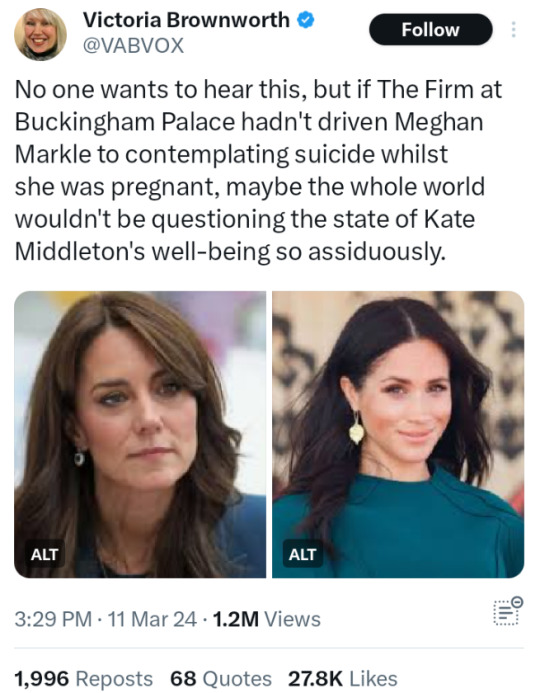#Victoria brownworth
Text



victoria brownworth, from living lesbian nation, from smash the church, smash the state! the early years of gay liberation, edited by tommi avicolli mecca
["One of the many ways 1970 differed from now is that queer youth— lesbian, gay, transgendered, even bisexual— were not honored, embraced, or even accepted except as sexual playthings. We were told, repeatedly and often not very nicely, that we were unsure, game-playing, too young to have made up our minds (this was in the days when being queer was perceived as a choice rather than orientation) about our sexuality, yet we were desired, which only added to the confusion of our status. These conflicting messages made becoming part of the burgeoning post-Stonewall movement all the more difficult to navigate for someone as young as I was when I moved into that circle of older queer men and women.
In addition, the movement was, and remainned for many years, male dominated and male focused. Those used to the LGBTQI political buffet can't imagine what it was like when it was merely G. That G-is-for-gay was expected to include anyone and everyone, regardless of gender or orientation, and include them—men, women, transgender people and bisexuals— under what often felt like a repressive and exclusionary male rubric.
The world Radicalesbians opened for me was one at an almost breathtaking variance with the rest of my life. The women in RL were predominantly women in their 30s and 40s, some of whom had been married to men but who had left their husbands and sometimes even their children for other women. Others were women who were stone butches who had never been with a man in any context and never would be, because women were their life. All, however, were hard-core feminists with a perspective that was defined by the surety that women were not second-class citizens but were, in many if not all respects, superior to men.
There was a self-confidence and self-acceptance in the women I met when I was a teenager in RL that was not reflected anywhere else in my life: Not at my all-girl high school, not in the gay bars I frequented with my fake ID and ready lies, not from my Seven Sisters-college-educated mother, nor from my female teachers. The time I spent in RL helped mold me into the radical lesbian feminist I still am today, but I would not know that until much later.
In my college years, reflecting back on my days in RL, I drifted toward lesbian-separatism and began to clarify for myself as well as for other women through my writing and activism, what it meant to be a lesbian in a gay male liberation movement. I needed to immerse myself in women, in lesbian feminist theory, in a world that was as removed from the patriarchy as we could create within a larger patriarchal society. It was a heady and difficult time, and many other women I knew were struggling to achieve this balance between the male-dominated heterosexual world and the gay liberation movement of which we were a presumptive part.
In the period when RL was functioning in Philadelphia, we held weekly meetings focused on political action and consciousness-raising. I met lesbians who would lead the movement in Philadelphia with me. Clarifying our positions as lesbians who were feminists, as opposed to male identified, was central to who we were as a group and as a model for the movement we were building— our lesbian nation. We read, we discussed, we planned, we got angry with men and male chauvinism and with subjugation within our own movement. We began what I would later come to view as stultifying, smothering rhetoric about the politics of sexuality that left little room for interpretation and which defined lesbian sexuality from the Andrea Dworkin vantage point: Penetration = subjugation = heterosexual mimicry. In our quest to denounce all things heterosexual and male, we had also inevitably denied ourselves the kind of expansive sexuality that gay men were concomitantly reveling in as we built our theory and our politics and they fucked their way through the decade post-Stonewall, forging a politics through sexual experience, rather than the desexualizing of theory.
The context of sexual liberation was limited in this lesbian-feminist, consciousness-raising, politically correct world to simple the right to be coupled with another woman, while over in the gay liberation movement it was defined as a continual debauch— sex with anyone and everyone, with a big fuck you! to the heterosexual paradigm under which gay men had, pre-Stonewall, been forced to live. For radical lesbian feminists, the goal was different: It was to eradicate the taint of men and heterosexuality and patriarchy from our lives in every way possible, from lipstick and bras to high heels and penetration. We were all engaged in the same liberation movement, but the things we saw as essential to that liberation were so different that one radical lesbian feminist declared that we would always have more in common with straight women than with gay men, because those women could share the common bond of our oppression, which gay men never could.
This was the conflict that kept Radicalesbians and Daughters of Bilitis separate from groups like Gay Activists Alliance and Homophile Action League. Sexuality was the bridge that connected us, but gender was what separated us. How could radical lesbian feminism and gay liberation meet, meld, and ultimately coalesce into a larger, workable model for a civil rights movement?
My formative years in RL were destined to define me as the quintessential man-hater: The patriarchy was my enemy and the enemy of all women. How could I then embrace the gay male liberation movement? How could both sides of the queer spectrum meet, when gay men had no interest in women or feminism and lesbian feminists had been so damaged by the patriarchy that dealing with men had caused and continued to cause many of us actual physical pain?
This conundrum haunted me as a teenager and well into my college years. I hung out at the gay coffeehouses and political action meetings of queer groups on the University of Pennsylvania campus at Hillel House and Houston Hall. I was also part of the gay and lesbian group at the college where I spent my undergraduate years, Temple University. There I met gay men with whom I would forge lasting political bonds."]
37 notes
·
View notes
Photo


#twitterature#Tom Cotton#Victoria Brownworth#The Dark Smite#student debt relief#student loans#logical fallacies#false equivalence#tax cuts
4 notes
·
View notes
Text

#All of the shitty frauds supporting Meghan Markle are going to have one hell pf a hangover when this is over#Victoria Brownworth#Katie Couric#Brooke Shields
0 notes
Text
Is cannibalism a term of racist abuse?
Candace Owens responded to a young woman challenging Owen's anti-trans rant by pointing out Native American Two Spirit people existed. Owens goes off on her, calling Native Americans cannibals and drug users. Shocking, racist and vile. pic.twitter.com/HXFRyCR5Eo— Victoria Brownworth (@VABVOX) October 28, 2023
Short answer: yes, and regularly used that way, throughout recorded history.
If you…

View On WordPress
#Aztec#BLM#blood libel#Candace Owens#cannibalism#Cannibals#Christopher Columbus#Colin Kaepernick#conquistadors#Conservative#Deep state#drugs#Hillary Clinton#Israel#Kanye West#LGBTQIA+#Meiwes#Mesoamerican#Native American#spirit#Trans#troglodytes#Trump#Turner Diaries#two-spirit#witches
0 notes
Text
Report: Nearly half of LGBTQ-owned businesses were denied COVID-relief loans
Report: Nearly half of LGBTQ-owned businesses were denied COVID-relief loans
By Victoria A. Brownworth
Through the worst of the COVID-19 pandemic that shuttered many small businesses, the federal government provided relief loans throughout that period. The Paycheck Protection Program (PPP) loans were available through May 31, 2021 through the U.S. Small Business Administration.
New data from the Center for LGBTQ Economic Advancement and Research (CLEAR) and Movement…
View On WordPress
0 notes
Text
Report: Nearly half of LGBTQ-owned businesses were denied COVID-relief loans
Report: Nearly half of LGBTQ-owned businesses were denied COVID-relief loans
By Victoria A. Brownworth
Through the worst of the COVID-19 pandemic that shuttered many small businesses, the federal government provided relief loans throughout that period. The Paycheck Protection Program (PPP) loans were available through May 31, 2021 through the U.S. Small Business Administration.
New data from the Center for LGBTQ Economic Advancement and Research (CLEAR) and Movement…
View On WordPress
0 notes
Text

Please, no what-about responses listing Lizzie Borden and ALL the other famous female killers...
4 notes
·
View notes
Text
Peggy Noodnik Writes Again (Kamala Harris 'Veep' Edition)
Peggy Noodnik Writes Again (Kamala Harris ‘Veep’ Edition)
Latest in our long-running series
Wall Street Journal columnist Peggy Noonan opened up the family-size can of worms with yesterday’s piece about the various and sundry deficiencies of Vice President Kamala Harris.
Kamala Harris Needs to Get Serious
Her shaky standing is a danger to the country given the position she could be called on to fill.
President Biden’s poll numbers are bad and Vice…

View On WordPress
#Barton Gellman#Charles Homans#DNC#hardwincing staff#Jaime Harrison#Jemele Hill#Joe Biden#Kamala Harris#New York Times#Peggy Noodnik#Peggy Noonan#Reuters/Ipsos poll#The Atlantic#Veep#Victoria Brownworth#Wall Street Journal
1 note
·
View note
Text

“Ableism, like homophobia, is a thing. It pervades our entire society. The Americans With Disabilities Act is an unreliable farce, & those of us who are disabled —1 in 5 — must battle with employers and landlords, doctors & health insurance companies to get what we need. We have to be activists whether we want to be or not, & yet all the while we must do our best to hide who we really are from those on whom we depend for survival.
But if 1 in 5 of us is disabled, that means everyone knows someone with a disability. Every family has one of us, every workplace, every school, every friend. We are everywhere.
But is disability addressed in any community — LGBT or any other — or are we shunted aside as much in [2022] as we were centuries ago, kept out of institutions by recent laws, but not by attitudes?.... People speak to the person pushing your chair as if you’ve been rendered mute.”
Via @Victoria A. Brownworth | @Brightorangerain | Mental Illness Support for the Open-Minded 2.0 | Spina Bifida Awareness, Info, & Support
#ableism#ableist#victoria a brownworth#quotes#disability#disabled#disabilities#ada#americans with disabilities act
2 notes
·
View notes
Photo



Reagan’s Court, Bush’s Sport
Abortion, Flag Burning and You
The abortion-restricting ruling of the U,S. Supreme Court in the case of [Webster] v. Reproductive Health Services is one of the most obvious legacies of the presidency of Ronald Reagan. This decision — following on the heels of rulings limiting affirmative action and other protections for women and minorities — points directly to the influence of the Reagan Justices on the laws of the nation.
That influence is being felt most directly by gay men and lesbians, women and people of color. The Court has placed very severe limits on abortion access with this ruling, just as it placed the responsibility for proving discrimination on those being discriminated against.
[...]
By appointing relatively young, ultra-conservative justices to the Supreme Court, Reagan insured that his conservative agenda will be perpetuated long after his presidency. [...]
While Reagan used the High Court to further his agenda, Bush may turn to the congressional mandate. Angered by the Court's ruling that flag-burning was a valid form of dissent, Bush began his campaign for a constitutional amendment banning the desecration of the American flag. Two weeks after the flag ruling, Bush reiterated his support for a constitutional amendment banning abortion.
Bush has received strong bipartisan support for his flag-protection initiative, and legislators nationwide have aligned with him on the abortion issue as well. And though polls show that over 75 percent of Americans approve of abortion under some circumstance, a majority of legislators are anti-abortion rights.
The impact of Supreme Court decisions is felt for years beyond the decision itself. The legacy of the liberal Court of Earl Warren changed the shape of American politics and civil rights in the 1960s and 70s. The Reagan Court has moved to overturn some of those decisions, and to rescind a vast majority of civil liberties, reversing the gains made by minorities and women in the last 25 years.
But as threatening as the conservative wave of the Court may be, the impact of constitutional manipulation is far more destructive, because of its permanence.
Once adopted, a constitutional amendment can only be rescinded by another constitutional amendment[.] This has only happened once in this century, in the case of Prohibition.
[...]
There is little doubt Bush will get his flag amendment adopted. If it passes, it will be the first time since Prohibition that Americans lose a right they previously had.
— Victoria A. Brownworth, OutWeek Magazine No. 6, July 31, 1989, p. 24.
#outweek#issue 6#lgbt history#abortion#flag burning#constitution#supreme court#webster v. reproductive health services#ronald reagan#george h.w. bush#victoria a. brownworth#photo#andrew lichtenstein#ben thornberry#patsy lynch#news analysis
17 notes
·
View notes
Text
40 WLW BOOK RECCOMENDATIONS
Here's a list of wlw book reccomendations and their genres since it's extremely hard to find. I haven't read most of these!!
young adult / contemporary || romance || fantasy / fairytale || sci-fi / dystopia || mystery / thriller || horror / paranormal || historical || coming of age
[ 1 ] The Miseducation of Cameron Post - Emily Danforth (coming of age, young adult)
[ 2 ] Annie on my Mind - Nancy Garden (romance, young adult)
[ 3 ] Of Fire and Stars - Audrey Coulthurst (fantasy, romance, young adult)
[ 4 ] The Abyss Surrounds Us - Emily Skrutskie (sci-fi, young adult)
[ 5 ] We Are Okay - Nina Lacour (young adult, contemporary)
[ 6 ] These Witches Don't Burn - Isabel Sterling (young adult, paranormal, contemporary, romance)
[ 7 ] The Henna Wars - Adiba Jaigirdar (young adult, contemporary, romance)
[ 8 ] Queen of Coin and Whispers - Helen Corcoran (fantasy, romance, young adult)
[ 9 ] Girl, Serpent, Thorn - Melissa Bashardoust (fairytale, fantasy, young adult)
[ 10 ] The Falling in Love Montage - Ciara Smyth (young adult, contemporary, romance, coming of age)
[ 11 ] Bleeding Earth - Kaitlin Ward (horror, young adult, dystopia, fantasy)
[ 12 ] Its Not Like its a Secret - Misa Sugiura (young adult, contemporary, romance)
[ 13 ] Criers War - Nina Varela (young adult, fantasy, romance)
[ 14 ] This is How you Lose the Time War - Amal El-Mohtar and Max Gladstone (sci-fi, romance)
[ 15 ] The Dark Tide - Alicia Jasinska (young adult, fantasy, romance)
[ 16 ] Tell Me How You Really Feel - Aminah Mae Safi (romance, young adult)
[ 17 ] The Difference Between Me and You - Madeleine George (young adult, contemporary, romance)
[ 18 ] Wilder Girls - Rory Power (young adult, mystery, thriller)
[ 19 ] Huntress - Kate Quinn (mystery, thriller, historical)
[ 20 ] Girls of Paper and Fire - Natasha Ngan (fantasy, young adult)
[ 21 ] The Priory of the Orange Tree - Samantha Shannon (fantasy)
[ 22 ] Fingersmith - Sarah Waters (historical, mystery, thriller)
[ 23 ] Tipping the Velvet - Sarah Waters (historical, romance)
[ 24 ] The Best Bad Things - Katrina Carrasco (mystery, thriller, historical)
[ 25 ] The Once and Future Witches - Alix E. Harrow (historical, fantasy)
[ 26 ] Wicked Saints - Emily A. Duncan (fairytale, young adult, fantasy)
[ 27 ] The Truth about Keeping Secrets - Savannah Brown (coming of age, young adult, contemporary, mystery, thriller)
[ 28 ] The Summer of Impossibilities - Rachael Allan (romance, contemporary, young adult)
[ 29 ] Youre Next - Kylie Schante (young adult, mystery, thriller)
[ 30 ] A Line in the Dark - Malinda Lo (mystery, thriller, young adult)
[ 31 ] High Desert - Kate Dalafield (mystery, romance)
[ 32 ] The Blind Goddess - Anne Holt (mystery)
[ 33 ] Ordinary Mayhem - Victoria A. Brownworth (mystery, thriller, horror, paranormal)
[ 34 ] The Haunting of Hill House - Shirley Jackson (horror)
[ 35 ] Into the Drowning Deep - Seanan Mcguire (sci-fi, hororr)
[ 36 ] The Red Tree - Caitlín R. Kiernan (fantasy, paranormal, horror, mystery)
[ 37 ] Sawkill Girls - Claire Legrand (coming of age, horror, young adult)
[ 38 ] As I Decended - Robin Talley (horror, young adult)
[ 39 ] Adaptation - Malinda Lo (sci-fi, young adult, thriller)
[ 40 ] The Seven Husbands of Evelyn Hugo - Taylor Jenkins Reid (historical, romance, contemporary)
This took a very long time to make so I would love it if you could repost!!!
#bookish#books#kindle books#bookaddict#book recommendations#book recs#dark academia#cottagecore#lovecore#romancecore#softcore#wlw#wlw blog#wlw yearning#wlw culture#wlw post#wlw textpost#wlw mood#wlw books#lesbian books#sappho#sapphic#sapphic stuff#sapphic things#sapphic post#book list#lesbian#girls who like girls#lgbtq books#lgbt books
5K notes
·
View notes
Text
Fetishizing The Gay Community

Let me start with a very brief explanation of this entire section because it will help in understanding the issue at hand: homosexual relationships in media (gay and lesbian being most of the content) are having heteronormative stereotypes forced onto these relationships. For those of you who do not know heteronormative, in short, is promoting heterosexuality. In this case it is taking the standards of a heterosexual relationship and applying it to a homosexual relationship as if they are synonymous.
To break this down into bite size pieces, the overarching idea throughout society is “male/masculine” or “female/feminine”. These two categories are then applied to these homosexual relationships thus changing them from what they really are to an altered more heteronormative version. By indulging in the concept of feminine and masculine partner in any relationship, we are continuing the cycle of a heteronormative society; however, because it is done through a same sex couple it gives off the appearance of inclusion.
Many people try to argue this idea that they might be fetishizing the community with statements like, “we're including this in our lives so obviously we support the community.” What these people fail to realize is they are not accepting the full image of homosexuals but rather this skewed heteronormative version. Put another way, “That’s like saying slavery was acceptance by white people wanting blacks in their lives.” (Brownworth) Pulling something into your life does not automatically make you supportive, an ally, or “okay” with it. If that were the case, using the above example, the whites would not have been okay with the horrid living conditions and treatment subjected upon African Americans, nor would the hatred and discrimination have continued after laws were established. Likewise, if same sex couples were truly accepted then people would understand that two women who are dating are both still inherently “females” and “feminine”, unless they so choose to change their gender identity.
In any aspect a woman can be more masculine or a male more feminine; however, it should not be assumed, implied, forced, or be centripetal to their acceptance into the LGBT community or society at large. This trend works to erase what is the central part of a same sex relationship- them being of the same sex.
I wanted to start with this one because it is so personal to my life and I want you all to understand that. This fetishizing affects the community and that is why its inherently an issue. When me and my wife wanted to get married everyone kept pushing for more and more heteronormative aspects to be included in our wedding. Someone had to wear a suit and the other a dress, someone waited at the altar and the other is walked down the aisle and given away. This fetishizing seeps into everyday life to the point where families and same sex couples themselves are having to fit into these bubbles to be accepted in a supposedly “accepting” community. We cannot allow this trend to continue because one partner will always be inherently erased when society is looking for the ‘masculine” and “feminine” partner in a same sex relationship.
Mass media only fuels the fire by promoting the idea that these relationships are the normal and are how same sex relationships should act. The Netflix Original, Prom, would be no exception to this idea. Putting aside the drama associated with the production of this piece, the messages are overall strong and work to show the struggles of being gay even in 2020 after laws protecting gays have been passed. The issue is heteronormativity is still a large aspect that few wish to address: from the “masculine” female being expected to ask the other out, stand strong (and alone) from parental and community backlash, only to inevitably end up wearing a suit in the final scene, it’s even blue to further sell the point; in contrast the “feminine” female hides away behind her mother for pretty much the entire plot, abandoning her partner to handle everything by herself and work to change their situation, also ends up wearing the cute dress, which to no one’s surprise is pink. The “male” fights for the relationship however needed, while the “female” sits by weakly and looks pretty.

Anyone can write about anything, as an English Creative Writing Major, I know this well. However, attempting to fictionally alter someone’s reality should be actively protested by anyone who notices it being done. “When we give straight writers the power to say we got our own relationships wrong and they know better, we are embracing our own oppression.” (Brownworth)
References:
Brownworth, Victoria. “The Fetishizing of Queer Sexuality: A Response.” Lambda Literary, 3 July 2020, www.lambdaliterary.org/2010/08/the-fetishizing-of-queer-sexuality-a-response/.
Damshenas, Sam, and Jamie Windust. “James Corden Drama aside, The Prom Is the Queer Celebration We Need This Year.” GAY TIMES, 8 Dec. 2020, www.gaytimes.co.uk/culture/james-corden-drama-aside-the-prom-is-the-queer-celebration-we-need-this-year-review/.
Price, Cameron. “Stop Fetishizing Gay People.” YouthCake, 1 Jan. 1970, www.youthcake.com/2019/01/stop-fetishizing-gay-people.html.
Rosenblum, Karen Elaine, and Toni-Michelle Travis, editors. The Meaning of Difference. 5th ed., McGraw-Hill Education, 2008.
Image:
Levering, Hannah. “The Prom Is a Testament to the Fact That Love Is Love.” The Central Trend, thecentraltrend.com/94437/opinion/the-prom-is-a-testament-to-the-fact-that-love-is-love/.
#lgbt#lesbian#gay#lgbtq#lgbtqia#bisexual#pansexual#asexual#aromantic#nonbinary#transgender#pride#demisexual#genderqueer#genderfluid#queer#demiromantic#rainbow pride#intersex#biromantic
4 notes
·
View notes
Photo

10 Things I Hate About You (1999) by Gil Junger
Book title: Like Mother, Like Daughter: How Women Are Influenced by Their Mother’s Relationship With Food-And How to Break the Pattern (1997) by Debra Waterhouse
Ten Stupid Things Men Do to Mess Up Their Lives (1998) by Laura Schlessinger
Dancing in the Street: Confessions of a Motown Diva (1994) by Martha Reeves and Mark Bego
The Rolling Stone Book of Women in Rock: Trouble Girls (1997) by Barbara O'Dair
Film Fatales: Independent Women Directors (1997) by Judith M. Redding and Victoria A. Brownworth
#10 things i hate about you#gil junger#patrick verona#heath ledger#books in movies#like mother like daughter#debra waterhouse#ten stupid things men do to mess up their lives#laura schlessinger#dancing in the street confessions of a motown diva#martha reeves#mark bego#the rolling stone book of women in rock trouble girls#pj harvey#barbara o'dair#film fatales#judith m. redding#victoria a. brownworth
107 notes
·
View notes
Link
1 note
·
View note
Link
1 note
·
View note
Photo

“You know what amazes me? Women have access to guns every day and despite the way we are treated by society, by bosses, by men who claim to love us, we are not sending people bombs nor shooting up schools or churches with AR15s. Take a lesson, men, and work on yourselves, not us.”
- Victoria #VoteBlue Brownworth
ALSO:

Source
“On Sitting With Fear”
“Women live a life of sustained fear. Which is not to say that most women exist in a state of heightened anxiety at all times, but is to acknowledge the reality that our lives are fundamentally different from men’s because of a real threat of rape/violence at the hands of men, mostly men we know. (And because we are stupidly and wrongly tasked with its prevention.) Men’s and women’s lives are very different in that way.”
6K notes
·
View notes